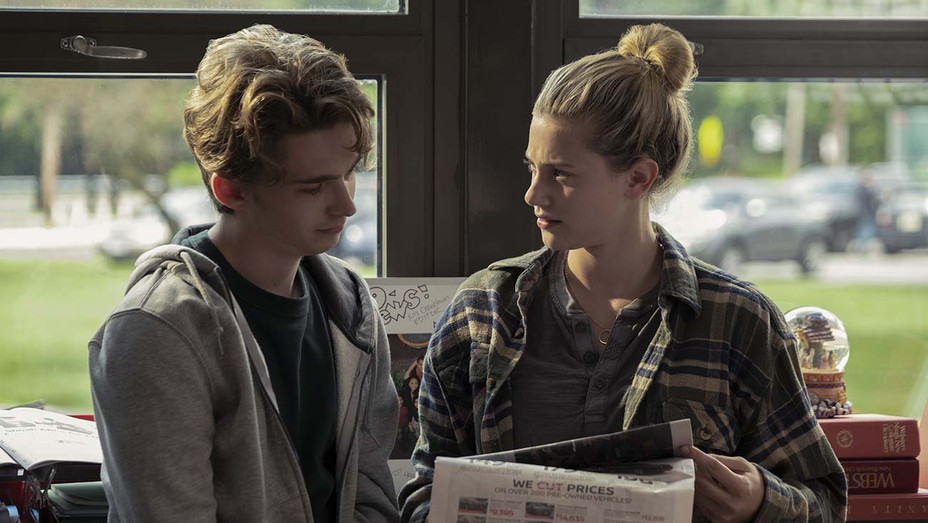The first remarkable thing about Chemical Hearts is that it’s the one-millionth adaptation of a sad teen romance novel. No one’s actually counting, but we’ve got to be close at this point. Like its thousands of progenitors, Chemical Hearts has all the hallmarks of the genre: melodramatic youths, love held back by a terrible loss, protagonists with dumb names (“Grace Town” is shameful and I will not be hearing otherwise)—the book it’s based on even describes itself as “not your average story of boy meets girl,” like they all do. That makes the second remarkable thing about Chemical Hearts all the more surprising: it’s really good.
That might have something to do with Richard Tanne, the man who directed the movie and adapted the book to script. Chemical Hearts is his first film after debut Southside with You, a Sundance breakout that told the story of Barack and Michelle Obama’s first date in the style of the Before trilogy. His debut has, admittedly, not aged well—it plays a little like undiscerning hero worship—but it announced Tanne as a talent to watch in the mumblecore scene. He brings those mumblecore roots to Chemical Hearts, turning the melodrama into something more of a mellow-drama, if you will.
Like the book it’s based on, Krystal Sutherland’s Our Chemical Hearts, the movie is told from the perspective of Henry Page (Austin Abrams), a high school senior who faces his lukewarm life with a shrug (probably because he hates how dumb his name is). When he’s chosen as the co-editor of the school newspaper alongside new student Grace Town (Lili Reinhart), the two do the obvious thing and have a meet cute in the parking lot. But it’s not your typical meet cute—no, this one is sad.
It’s sad for good reason, though, and skirts around the performative edginess of the genre’s usual stock. Refreshingly, Henry doesn’t act like his privileged but uneventful life is some great burden, giving his archetypal “ugh” attitude a more true-to-life bent: he’s not sullen because he’s a teenager who doesn’t care about anything; he’s sullen because he’s learning that the world doesn’t care about him. Austin Abrams conveys this well in his performance, always giving the impression that he’s making do in a hostile environment rather than shaking his heart’s fist at the powers that be. Grace Town’s troubles are more obvious: she walks with a limp and a cane, avoids social interaction en masse, and is often mistaken for an urban area that’s smaller than a city.
Inevitably, Grace and Henry begin to fall in love, and Grace’s tragic past bubbles to the surface. But their relationship stays tonally low-key, thanks to Tanne’s mumblecore sensibilities: you can tell the director values capturing down-to-earth moods over moving people to tears. Chemical Hearts’ romance is designed to sink in, not to pierce. Tanne and cinematographer Albert Salas know how to compose a two shot, framing Grace and Henry together in ways that accentuate their romantic tension—but they also know how to position their characters in empty space. Some shots see the lovers joined like two lone stars in the vast, black night, emphasizing the loneliness of all places but each other; others stress the unbridgeable distance between people coming into their own.
It’s affective filmmaking, and along with a color palette that makes the world look perpetually overcast—soaked and saturated, but still grey and foreboding—it generates vibes both lovely and lovelorn. Funnily enough, the plot elements most central to the book feel incidental next to the ambiance. The concept to which the title refers, that our love lives are driven by deterministic chemicals, is just an afterthought for narration to throw away. Henry’s hobby—the very obvious metaphor of fixing broken pottery—is made so unsubtle by the addition of visuals that the movie seems embarrassed to explain it. Tanne would’ve been better off eliminating lines like “I’m not one of your pots!” entirely, as he’s more adept at bringing the plot’s atmosphere to life than adapting the plot itself. That the sets can outshine the events therein is further proof of this.
But even where Chemical Hearts falters, Austin Abrams is its savior. Lili Reinhart shows growth as an actor and a level of maturity deserving of graduation from Riverdale, but it’s Abrams who demonstrates a capacity for the biggest of things. His grasp on the material is almost critical, as he downplays the weaker, overwritten lines and turns them into understated strengths. He also has what Paul Schrader describes as “mysterious facial physiognomy”: he keeps us interested in and intrigued by his inner self by adjusting his facial performance to the smallest—but still meaningful—degrees. He’d be a perfect muse for a director like Schrader or Jarmusch. For now, he’s a fitting muse for a director like Tanne, who’s turned Chemical Hearts into a passionate sacrament sure to resonate with the teenaged among us.
★★★★ (4/5)




